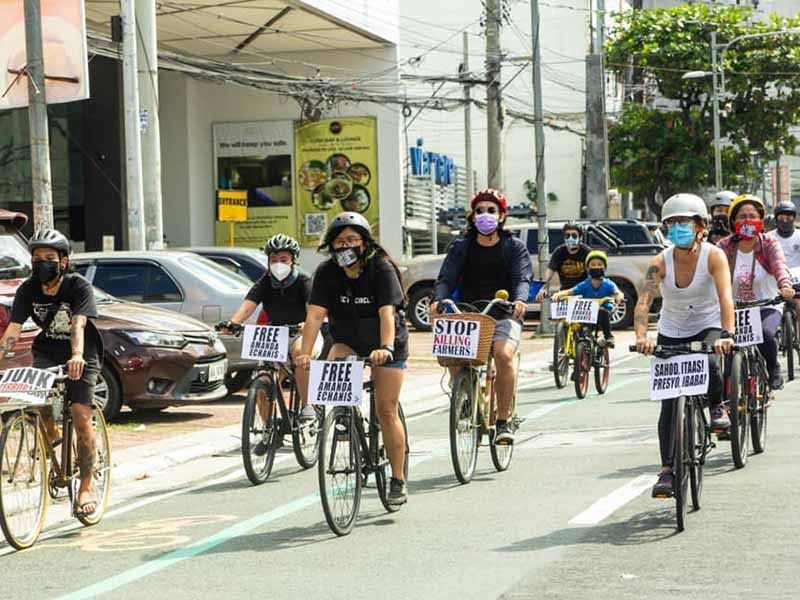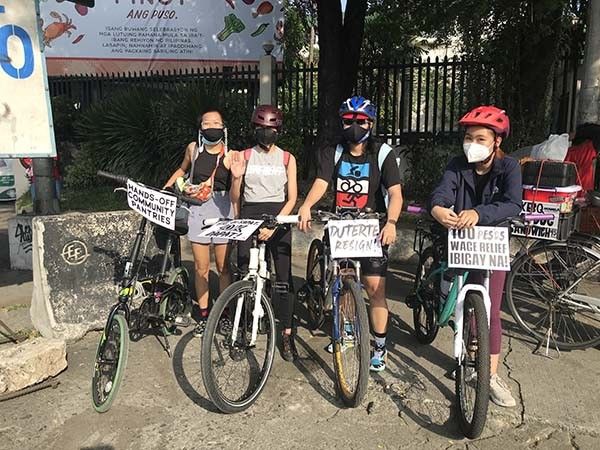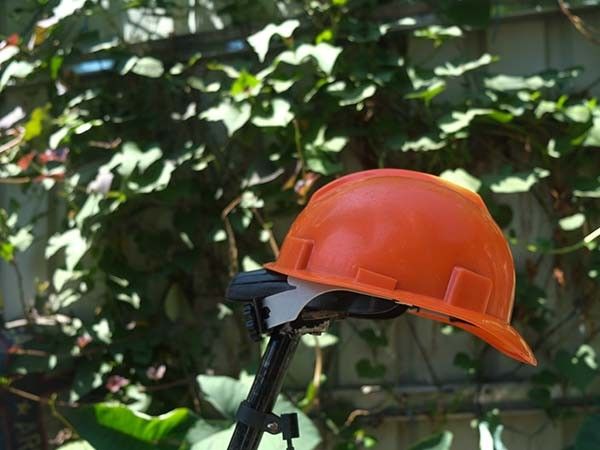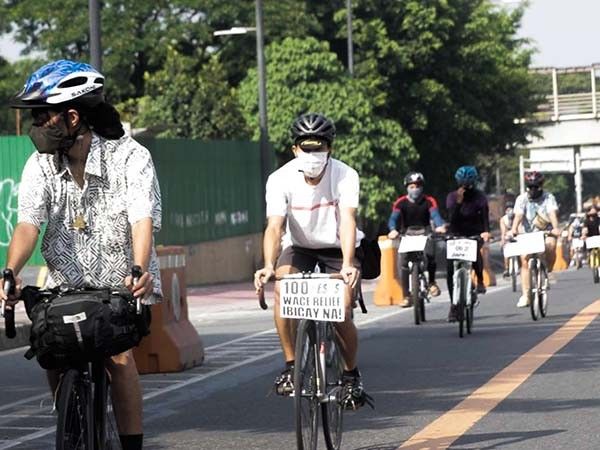To pedal is to navigate to a better world

Photos: SAKA, Umani Productions and Geela Garcia
MANILA, Philippines (Updated 6:31 p.m.) — Government-imposed curfews and limited public transportation take a toll on daily wage earners who take jeepneys to work.
This lack of transportation options has led to more people opting to commute on bicycles as a safer alternative to taking a chance of catching a ride while the government irons out issues with transportation supply.
RELATED: Delayed service contracting program leaves many transport workers on sidelines
Rosamar Yusoya works as a housekeeper for a transportation company. She said that the worsening public transportation made it impossible for her to arrive at work on time.
"I decided to bike to work so I could arrive on time. I’m assigned to clean in the morning and if I arrive any later than 5:20 am, then that would be counted as absent—no pay," Yusoya said in Filipino.

A group of women bikers joins SAKA’s bike rally
For Kim Obel, who has been cycling pre-pandemic, biking saves her money and lessens her carbon footprint. But as a woman, she also encounters catcallers on the road.
She recalls publicly calling out a male cyclist she once used to train with after discovering that the cyclist takes malicious photos of women while on his bike.
Obel observed that back in 2015, it was rare to see women aggressively calling out catcalling bikers on the road. However, the scene is changing now with Facebook groups such as “Pinay Bike Commuter Community”, where women have safe spaces to talk about their experiences on the road.
"I am happy to see women standing up for what’s right against harassers, protecting each other, speaking out the truth through social media, becoming stronger as we empower each other," Obel added.
Yusoya has fortunately not experienced sexual harassment, but she pointed out that car drivers can be arrogant on the road.
She experiences intimidation from drivers who honk aggressively and was also once thrown off of her bike when a driver suddenly opened his car door, causing her to lose balance and fall to the ground.
"It was frightening to bike at first, but I told myself I have to overcome my fear since I’m the breadwinner in our family. Biking is my way to go to work to earn money. Nervousness and fear are normal, and my advice to female bikers is to gather up strength because I was able to overcome my fear when I convinced myself that I can do it,” Yusoya said.
“It’s also motivating to see fellow bikers greet each other on the road even if we’re strangers. When a group of bikers comes across me, they would ring their bell to greet me, which lightens up my mood," she said.
"Bikes are friendlier, they can’t kill people, unlike fast-moving cars. What bikers want are really just safer bike lanes—we just want to find our space."
RELATED: In ECQ 'bubble', checkpoints for commuter safety harm hard-up drivers
Mobility beyond the bike lane

Ernie Galagate’s helmet rests on his rusty old bike. He cannot afford a bike helmet so he uses his construction helmet as an alternative.
"There are roads in Makati where I’m not allowed to pass, it’s because I don't have a proper helmet," said Ernie Galagate, a construction worker who bikes to work.
He said he bought his bike from a stranger who looked desperate and sold it to him for P800. Galagate has been biking to work for three years, and has never been able to afford a helmet.
"I earn P550 a day, a helmet costs around that amount. Helmets are important, but since I earn so little, it all goes to food and our expenses at home. I simply can’t save enough for one," explained the construction worker.
"I also wish I could afford a bike made of alloy. The bike I’m using now is secondhand. It is made of steel and is already old, I’m worried it will break down over time," added Galagate.
According to the construction worker, he builds and repairs houses located at executive villages around Ortigas, Alabang, and San Juan—spaces so different from the urban poor community in Quezon City where he lives.
His bike saves him around P320 of commute money each day, but it also tires him out easily. "If I wouldn’t bike, nothing would be left from my small salary. I bring soup in my backpack as my baon to work, since it soothes the exhaustion I feel from biking and construction," Galagate explained.

Among the calls at a recent bike protest was for a P100 daily wage relief to workers
Like other bikers, Galagate wishes for wider bike lanes. But beyond their mobility on the road, Galagate also dreams of navigating in a more inclusive society.
Mobility and mobilization
With movement restrictions in place, the bicycle has also become a tool for working for that more inclusive society. Community quarantines are the Duterte administration's most felt solution to control the spread of COVID-19 and protests and the people's right to physically unite and publicly demonstrate their calls have been limited.
As cyclists started to occupy highways due to lack of public transportation, anti-feudal artists alliance SAKA, introduced bike protests while the country was under GCQ last year to call for free mass testing.
For SAKA, in-person mobilizations are necessary to forward the people's calls especially when the government fails to listen, and bike protests make this possible since cycling promotes movement while ensuring ventilation.
"Duterte has turned a deaf ear to the people's demand for free mass testing, but we will carry on demanding it again and again," Donna Miranda of SAKA said in a statement then.
A year later, and with the country earning the title of the world’s longest lockdown while experiencing its worst recession, SAKA, joined by other peasant organizations, continues to hold bike rallies, this time in solidarity with workers for Labor Day.
Carrying demands regarding health, food, jobs, aid and sovereignty, the bike rally’s route covered government offices around Quezon City, including the Department of Agrarian Reform and the Department of Agriculture.
Bikers also made a stopover at the Maginhawa Community Pantry to bring their calls to the people most affected by the government’s insufficient pandemic aid.
Isa sa mga stopover ng Padyak Pesante kanina ang Maginhawa Community Pantry. Napakahaba ng pila, at hindi sana pipila sa ilalim ng tirik ng araw ang libo-libong Pilipino kung may sapat na ayuda mula sa gobyerno. pic.twitter.com/ce3T7OUTki
— Cathy Estavillo (@cathyestavillo) April 24, 2021
Cathy Estavillo, secretary-general of AMIHAN Peasant Women, communicated farmers' calls to the people lined up at the pantry.
"If only the government supported our local farmers in their production, Filipinos wouldn’t experience hunger. They would have the capacity to buy our farmers’ produce at affordable prices without depending on pantries. The government has the budget and the biggest resources, and it can address the people’s hunger," Estavillo explained to the people.
Urban poor group KADAMAY also conducted a similar bike protest to demand aid, free mass testing, and assert the right of the poor.
"Our bike protest is a creative demonstration from the urban poor sector regarding the virus and the growing food insecurity," Mimi Doringo, KADAMAY secretary-general told Philstar.com.
She said that money allocated to the National Task Force to End Local Communist Armed Conflict could instead be used for aid to 1.9 million poor Filipino families. KADAMAY is among the activist groups that the government frequently accuses of being fronts for communist rebels.
Like the establishment of community pantries, the rise of cycling are a response to a lack of government action on the public's needs. Like the communities that have grown around cycling and bike commuting, the pantries have become a loose network of mutual aid and support.
Both show potential for changing how things are done in the "new normal."
- Latest































